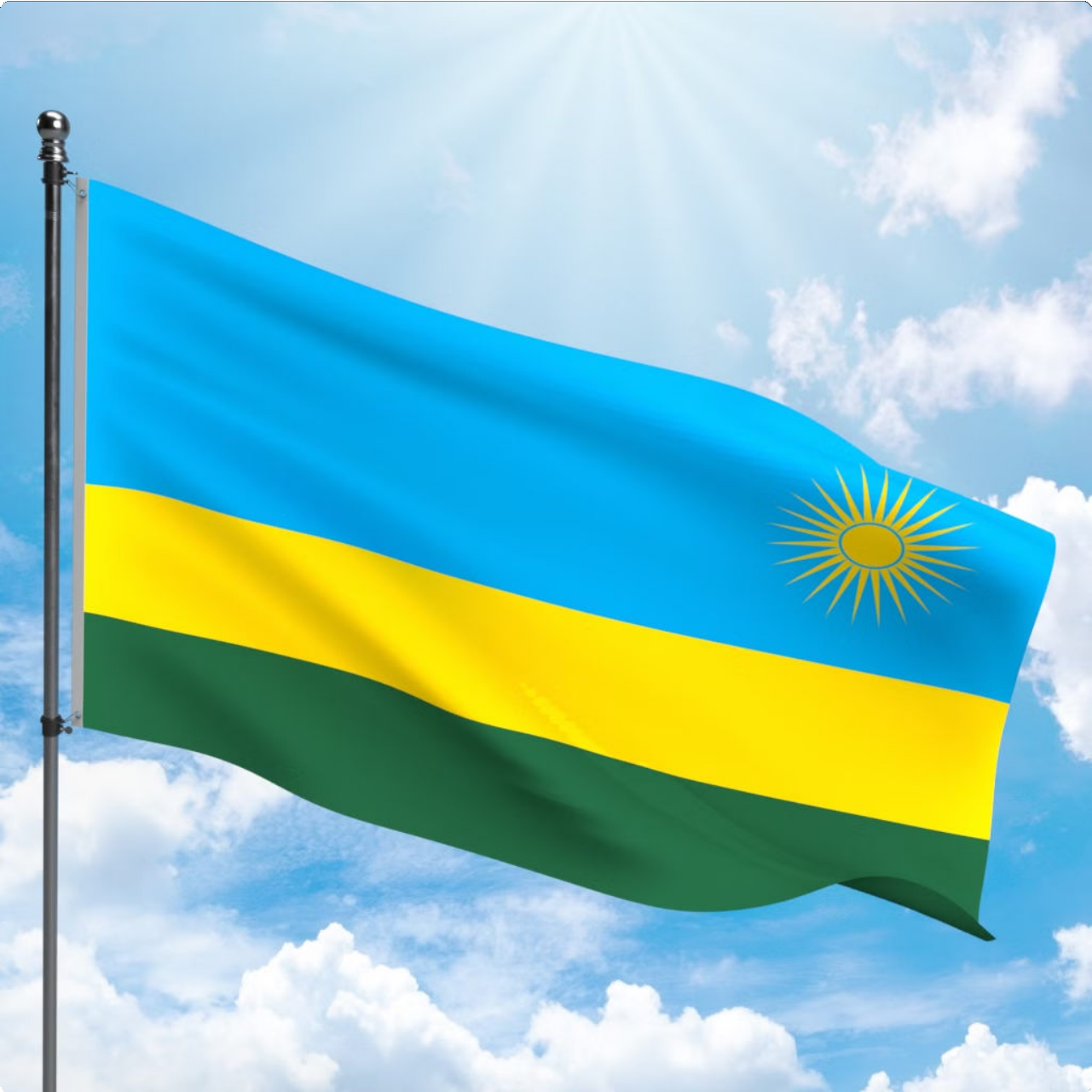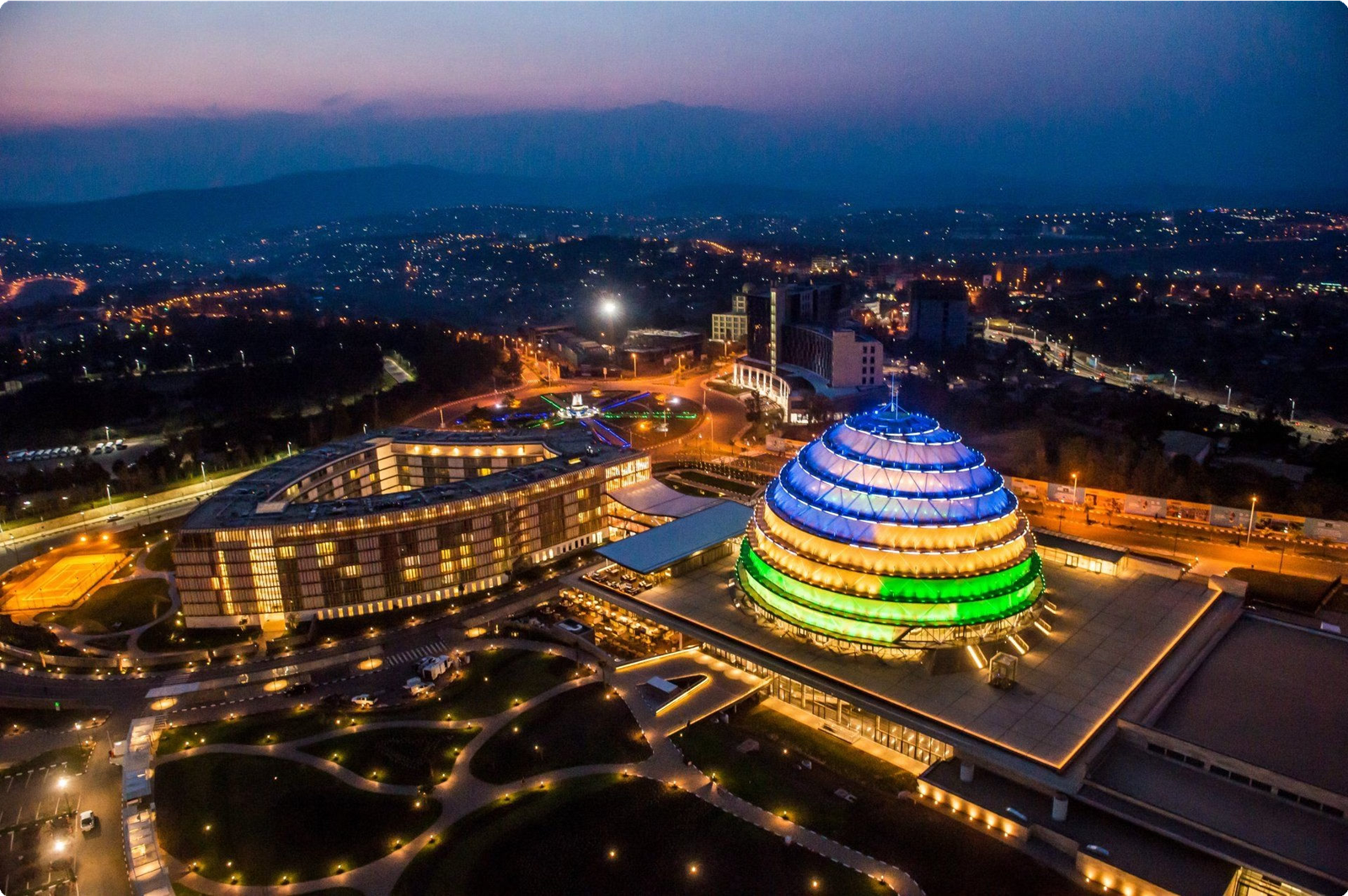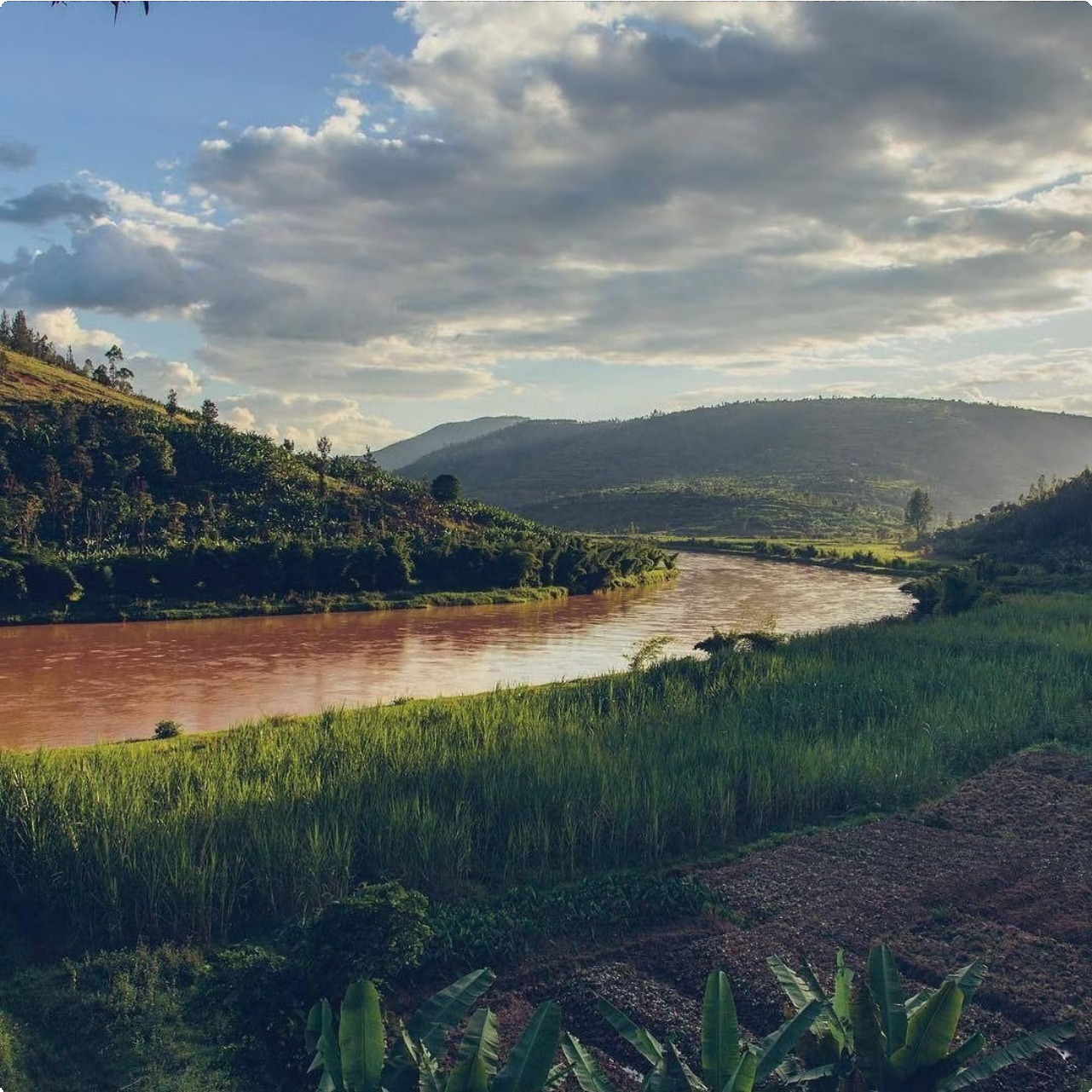Rwanda
Discover Rwanda
Rwanda, known as the “land of a thousand hills,” is a captivating East African country renowned for its remarkable biodiversity, vibrant culture, and rich history. Nestled in the heart of the continent, Rwanda is home to lush rainforests, majestic mountains, and an abundance of exotic wildlife, making it an ideal destination for nature enthusiasts and adventurous travelers alike.

With a compelling mix of traditional heritage and modern development, Rwanda has emerged as a beacon of progress and innovation, attracting global attention for its sustainable initiatives and economic growth. Its diverse and welcoming communities, coupled with the nation’s resilience and determination, reflect the spirit of a country that has transcended adversity to embrace a prosperous future.
Flag of Rwanda
The flag of Rwanda consists of three horizontal bands in blue, yellow, and green color. The blue band symbolizes happiness and peace, the yellow band represents economic development, and the green band embodies hope of prosperity. In the center of the flag, there is a yellow sun with 24 rays, symbolizing the hope of a new dawn and shedding light on the country’s progress. The flag was adopted on October 25, 2001, replacing the previous flag. It reflects the cultural and historical significance of the country and is displayed proudly at national events and institutions across Rwanda.

Map of Rwanda
Rwanda, known as the “land of a thousand hills,” is a country located in the heart of Africa. The map of Rwanda showcases its stunning landscape, characterized by verdant hills, winding rivers, and picturesque lakes. The country’s central location on the African continent is highlighted on the map, emphasizing its strategic importance as a crossroads for trade and commerce.

From the vibrant capital city of Kigali to the tranquil shores of Lake Kivu, the map provides a glimpse of the diverse terrain and topographical features that make Rwanda an enchanting destination for travelers and nature enthusiasts. The lush greenery and breathtaking natural beauty depicted on the map offer a preview of the captivating experiences awaiting visitors to Rwanda.
Currency of Rwanda
Official Currency: The official currency of Rwanda is the Rwandan Franc (RWF), denoted by the symbol “RF”. It is further subdivided into 100 smaller units called centimes.

Currency Code: The international currency code for the Rwandan Franc is RWF, as prescribed by the ISO 4217 standard. This code is used in international financial transactions and currency exchange markets.
Banknotes and Coins: The Rwandan Franc is available in various denominations, including banknotes of 500, 1000, 2000, 5000, and 10000 RWF, and coins of 1, 5, 10, 20, 50, 100, and 500
RWF. The vibrant designs and colors on the currency reflect the rich culture and natural beauty of Rwanda.
Economy of Rwanda
Industry: Rwanda’s economy has seen significant growth in recent years, with key industries including agriculture, mining, tourism, and services. The agricultural sector employs the majority of the population and is a major contributor to the country’s economy. The production of coffee and tea for export is a significant part of Rwanda’s agricultural industry.
Investment Opportunities: The government of Rwanda has been actively promoting investment in various sectors, including technology, manufacturing, and infrastructure. The country’s strategic location and business-friendly policies make it an attractive destination for foreign investors.
Trade: Rwanda has been working on expanding its international trade partnerships, particularly within the East African Community. The country’s main export partners include the Democratic Republic of Congo, Switzerland, and China.
Culture of Rwanda
Traditional Clothing: Rwandan traditional clothing is known for its vibrant colors and intricate patterns. The women often wear “imishanana,” a colorful, wrapped garment, while men wear “ibitenge,” a cloth wrapped around the body or as a headscarf.

Art and Craft: The Rwandan culture is rich in traditional art and crafts, including beautiful handwoven baskets, traditional pottery, and wood carvings. These crafts are not only decorative but also carry deep cultural significance.
Language and Communication: Kinyarwanda is the official language of Rwanda and is spoken by the majority of the population. Additionally, French and English are also widely used, reflecting the country’s colonial history and diverse linguistic landscape.
Family and Community: Family and community play a crucial role in Rwandan culture. The extended family structure is common, and Rwandans place great emphasis on respect for elders and communal support.
Traditional Dances in Rwanda
Umushagiriro Dance
Umushagiriro is a traditional Rwandan dance known for its energetic and rhythmic movements. The dancers wear vibrant attire and perform intricate footwork accompanied by the beats of traditional drums. This dance is often performed during joyful celebrations and cultural events, showcasing the rich heritage of Rwanda.

Intore Dance
The Intore dance is a highly ceremonial and symbolic dance that originated in Rwanda. It involves graceful movements, extravagant costumes, and synchronized choreography. Historically, the Intore dancers were considered elite performers who entertained the royal court. Today, the dance continues to be an important part of Rwandan cultural festivals and gatherings.
Umushayayo Dance
Umushayayo is a traditional Rwandan harvest dance performed by both men and women. The dance signifies unity, cooperation, and gratitude for the bountiful harvest. Dancers move in sync to the rhythm of traditional songs, creating a captivating and joyous spectacle that embodies the communal spirit of Rwandan culture.
Rwandan Cuisine
Rwandan cuisine is known for its simplicity and use of locally grown ingredients. One of the staple foods in Rwanda is ugali, a starchy dish made from maize flour and served as a side dish with various accompaniments such as meat, vegetables, or bean stew. Another popular dish is isombe, a meal made from cassava leaves, often served with rice or plantains. The Rwandan cuisine also features a unique dish called matoke, which consists of plantains cooked with beans and groundnut sauce.

The country’s cuisine also includes a variety of brochettes, which are skewered and grilled meats, usually served with vegetables. In addition to its savory dishes, Rwanda offers an array of sweet treats, including fresh tropical fruits like pineapples, papayas, and passion fruits. To complement the meals, Rwandans enjoy a traditional beverage called urwagwa, a type of banana beer with a sweet and tangy taste.
Famous Celebrities from Rwanda
Angelique Kidjo
Angelique Kidjo is a Grammy Award-winning singer-songwriter and activist originally from Benin, known for her powerful voice and diverse musical style. She has collaborated with artists from around the world and has been an influential figure in promoting African music on the global stage.

Sherrie Silver
Sherrie Silver is a Rwandan-born dancer and choreographer who has worked with some of the biggest names in the music industry, including Childish Gambino and Rihanna. She gained international recognition for her choreography in the music video for Childish Gambino’s hit song “This Is America.” Silver is also an advocate for social justice and has used her platform to raise awareness about issues affecting African communities.

Israel Mbonyi
Israel Mbonyi is a talented Rwandan gospel artist known for his soulful music and inspiring lyrics. His songs have touched the hearts of many and have become anthems of hope and faith. Mbonyi’s powerful vocals and emotive performances have made him a beloved figure in the Rwandan music scene.

Best cities to visit in Rwanda
Kigali: The capital city of Rwanda, known for its vibrant markets, dynamic arts scene, and the Kigali Genocide Memorial.
Butare: Often referred to as the intellectual city of Rwanda, home to the National University of Rwanda and several museums showcasing the country’s history and culture.
Gisenyi: Situated on the shores of Lake Kivu, offering stunning views of the lake and tropical beaches, making it a popular destination for relaxation and water sports.
Musanze: The gateway to Volcanoes National Park, where visitors can trek to see the endangered mountain gorillas in their natural habitat.
Kigali
Kigali, the capital and largest city of Rwanda, is a vibrant metropolis known for its lush hills, bustling streets, and dynamic culture. The city is a hub of economic, political, and cultural activities, with modern infrastructure and a lively atmosphere.

Visitors to Kigali can explore the Kigali Genocide Memorial, which pays tribute to the victims of the 1994 genocide, providing important historical and cultural insights. The city also offers a variety of dining options, from local markets serving traditional Rwandan dishes to upscale restaurants showcasing international cuisine.
The vibrant arts scene in Kigali is highlighted by the Inema Arts Center, where visitors can engage with contemporary Rwandan art and meet local artists. Additionally, the city’s colorful markets, bustling neighborhoods, and friendly locals create an unforgettable urban experience.
Butare
Butare, also known as Huye, is a city located in the southern part of Rwanda. It is renowned for being the country’s intellectual center, hosting the esteemed National University of Rwanda and several other academic institutions.

The city is blessed with a pleasant climate, picturesque landscapes, and a rich cultural heritage. Visitors to Butare can explore the fascinating ethnographic museum, enjoy traditional dance performances, and immerse themselves in the vibrant local arts scene.
Butare is also home to the stunning Nyungwe Forest, one of the largest montane forests in East Africa, offering incredible biodiversity and captivating hiking trails. The city provides a unique blend of academic excellence, cultural richness, and natural beauty, making it a must-visit destination in Rwanda.
Gisenyi
Gisenyi, also known as Rubavu, is a beautiful city located on the shores of Lake Kivu in Rwanda. The city offers stunning views of the lake and its beaches, making it a popular tourist destination. Visitors can enjoy activities such as swimming, beach volleyball, and boat rides while taking in the panoramic scenery.

The city is also known for its vibrant markets, where locals and tourists mingle to shop for traditional crafts, fresh produce, and souvenirs. Gisenyi provides a unique blend of natural beauty and cultural experiences, making it a must-visit destination in Rwanda.
Musanze
Musanze is a charming town located in the northern part of Rwanda. It is best known as the gateway to Volcanoes National Park, where visitors can embark on unforgettable gorilla trekking experiences. The town itself offers a delightful blend of scenic beauty and cultural experiences. Visitors can explore vibrant markets, interact with friendly locals, and enjoy the breathtaking views of the surrounding volcanic landscape.

In addition to its proximity to the national park, Musanze is also home to a variety of accommodation options, ranging from luxury lodges to budget-friendly guesthouses. The town’s welcoming atmosphere and stunning natural attractions make it a must-visit destination for travelers seeking adventure and cultural immersion in Rwanda.
Nyungwe Forest
Nyungwe Forest is a lush, mountainous rainforest situated in the southwest region of Rwanda. Spanning over 1000 square kilometers, it is one of the oldest and most well-preserved rainforests in Africa, offering a rich biodiversity and unique flora and fauna. Visitors to Nyungwe Forest have the opportunity to explore a network of hiking trails, encounter over 13 different primate species, including chimpanzees and colobus monkeys, and admire the stunning canopy walkway that provides breathtaking views of the forest.

The forest is a paradise for birdwatchers, with over 300 bird species identified within its boundaries. It is also home to fascinating plant life, including giant lobelias and beautiful orchids. Nyungwe Forest is a haven for nature enthusiasts, offering an immersive and unforgettable experience in the heart of Rwanda.
Akagera National Park
Akagera National Park, located in the eastern part of Rwanda, is a diverse ecosystem that is home to a wide variety of wildlife. The park encompasses rolling hills, woodland, swamps, and grassland, offering a stunning landscape for visitors to explore. The park is known for its picturesque savannah, lakes, and diverse wildlife, including elephants, lions, giraffes, zebras, and numerous bird species.

Visitors can enjoy a range of activities such as guided game drives, boat trips on Lake Ihema, and nature walks. The park also borders Tanzania and is part of the greater Akagera-Mara ecosystem, providing a unique opportunity to experience the rich biodiversity of the region.
Lake Kivu
Lake Kivu is one of the great African Great Lakes, situated on the border between Rwanda and the Democratic Republic of the Congo. It’s renowned for its breathtaking scenic beauty and is a popular destination for travelers seeking serenity and natural splendor.

The lake offers a range of activities, including boat trips, swimming, fishing, and water sports. Visitors can also explore the nearby towns and villages, experiencing the local culture and cuisine. The stunning sunsets over the tranquil waters of Lake Kivu make for a captivating and memorable experience.
Volcanoes National Park
Located in the northern part of Rwanda, Volcanoes National Park is a haven for nature lovers and wildlife enthusiasts. The park is known for its lush landscapes and the majestic Virunga Mountains. Visitors can embark on guided treks to encounter the critically endangered mountain gorillas, providing a once-in-a- lifetime opportunity to observe these remarkable creatures in their natural habitat.

In addition to gorilla treks, the park also offers the chance to spot golden monkeys, visit the tomb of famous zoologist Dian Fossey, and immerse in the rich biodiversity of the region. Volcanoes National Park is a testament to Rwanda’s commitment to conservation and sustainable tourism, making it a must- visit destination for those seeking an unforgettable encounter with nature and wildlife.
Nyamata Genocide Memorial
The Nyamata Genocide Memorial is a somber yet important reminder of the tragic events that occurred in Rwanda in 1994. Located in the town of Nyamata, the memorial stands on the site of a former church where thousands sought refuge during the genocide. The memorial serves as a place of remembrance for the victims and a source of education for future generations, with graphic displays and preserved evidence from the genocide. It offers visitors a sobering and deeply moving experience, allowing them to pay their respects and gain insight into the devastating impact of the genocide on the Rwandan people.

Nyanza Royal Palace
Nyanza Royal Palace, also known as Rukali Palace, was the traditional seat of the monarch in the Kingdom of Rwanda. The palace is located in the Southern Province of Rwanda and serves as a historical and cultural landmark. The architecture, featuring traditional design elements and ancient artifacts, provides insight into the country’s rich royal heritage.

Visitors can explore the royal grounds and observe traditional rituals and ceremonies, offering a glimpse into the historical significance of the palace. The interior of the palace showcases royal regalia, ancient artifacts, and traditional artwork, providing a captivating experience for history enthusiasts and cultural explorers.
Inema Arts Center
The Inema Arts Center, located in Kigali, Rwanda, is a vibrant hub for contemporary African art and creativity. Founded by two brothers, the center showcases a diverse collection of paintings, sculptures, and other artworks created by talented Rwandan artists. The space serves as a platform for emerging and established artists to express themselves, share their stories, and contribute to the rich artistic tapestry of Rwanda.

Visitors to the Inema Arts Center can immerse themselves in the local art scene, interact with the artists, attend workshops, and even purchase unique artworks that reflect the beauty and culture of Rwanda.
The center not only fosters artistic expression but also promotes cultural exchange and community engagement through its various programs and initiatives.
Kigali Genocide Memorial
The Kigali Genocide Memorial is a profoundly moving place of remembrance located in Kigali, the capital city of Rwanda. It serves as a memorial to the victims of the Rwandan Genocide, which took place in 1994. The memorial documents the tragic events of the genocide, honoring the memory of the approximately one million individuals who lost their lives during that period of unspeakable violence.

Visitors to the memorial can experience thought-provoking exhibitions, witness emotional testimonies, and pay their respects at the mass graves on the site. The memorial also houses a poignant children’s exhibit, representing the innocent lives lost during the genocide and fostering a message of unity and peace for future generations.
Lake Muhazi
Lake Muhazi is a picturesque and serene body of water located in Rwanda. The lake, surrounded by lush greenery and rolling hills, offers a tranquil escape from the bustling city life. Its crystal-clear waters and calm atmosphere make it a favored destination for nature lovers and those seeking relaxation. Visitors can partake in various water activities such as boating, fishing, and birdwatching, while also marveling at the stunning panoramic views. The surrounding area features charming villages and a diverse array of flora and fauna, adding to the allure of Lake Muhazi as a must-visit destination in Rwanda.

Nyabarongo River
The Nyabarongo River is the longest river in Rwanda, flowing from its source in the southern part of the country. It merges with the Akagera River, forming the most distant headstream of the Nile. The river’s winding course cuts through the picturesque Rwandan landscape, providing essential water resources for agriculture and wildlife in the region.

With lush banks and diverse flora and fauna, the Nyabarongo River is not only vital for irrigation and hydroelectric power generation but also offers stunning views and recreational opportunities for visitors exploring the natural beauty of Rwanda.
Conclusion
Rwanda is a country of rich history, captivating culture, and breathtaking landscapes. It offers a unique blend of authentic experiences, from exploring vibrant markets to trekking through lush national parks. The warm hospitality of the Rwandan people adds an extra allure to this beautiful nation. As a conclusion, Rwanda stands as an intriguing destination for travelers seeking adventure, cultural immersion, and natural beauty.

With its diverse offerings and warm community, Rwanda is an ideal choice for those looking to broaden their horizons and create lasting memories. Whether it’s discovering the tradition of the Intore dance, savoring the flavors of local cuisine, or embarking on a safari adventure, Rwanda provides a captivating journey for every visitor. It’s a place where history meets modernity, and each corner holds a unique story waiting to be explored.